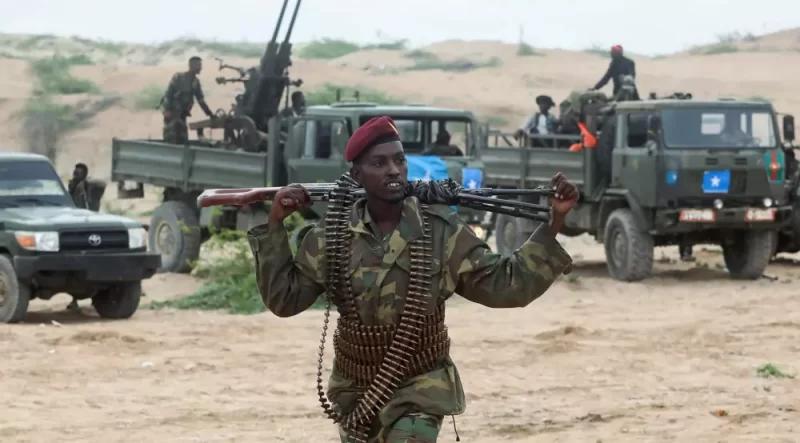The United Nations Security Council has voted to lift the arms embargo on Somalia’s government and its security forces, ending more than 30 years of restrictions on weapons deliveries to the Horn of Africa country.
The council adopted two British-drafted resolutions on Friday, one to remove the full arms embargo on Somalia and another to reimpose an arms embargo on Al Qaeda-linked Al Shabaab militants, who have been fighting the Somali government since 2006.
The move is aimed at strengthening the Somali government’s ability to combat the Islamist insurgency and restore stability and security in the country, which has been mired in civil war and chaos since the overthrow of dictator Mohamed Siad Barre in 1991. The council also expressed concern about the lack of safe ammunition storage facilities in Somalia and urged other countries to help the Somali government construct, refurbish and use safe ammunition depots across the country.
Somalia’s President Hassan Sheikh Mohamud welcomed the decision, saying it would help modernize the country’s armed forces and enable them to acquire the necessary weapons and equipment to fight Al Shabaab and other threats. He also thanked the “friendly nations and allies” who supported the lifting of the embargo and said his government would ensure that the arms would not fall into the wrong hands.
In a press statement, the Somalian government stated “The lifting of the arms embargo is a testament to the collective efforts and unwavering commitment of the international community to support Somalia in its pursuit. of lasting peace. This crucial development will significantly bolster the capabilities of the Somali National Army, enabling it to acquire the required equipment necessary to effectively combat terrorist threats and eradicate them from our country.”
“As we move forward, the Federal Republic of Somalia remains dedicated to working collaboratively with the international community to build a safer and more secure future for our nation. The government looks forward to continued cooperation in addressing challenges and seizing opportunities that he ahead.”
Although, some analysts, however, have warned that Somalia still faces challenges in ensuring the proper management and accountability of the arms and that the lifting of the embargo could fuel the proliferation of weapons in the region. They also cautioned that the Somali government still needs to improve its governance, human rights and reconciliation efforts and that the international community should continue to support the country’s political and security transition.
Somalia has been relying on the support of African Union forces, as well as Western powers such as the United States and Turkey, to maintain security and counter the threat posed by Al Shabaab and other militant groups operating within the country.
Last month, Mohamud vowed to eliminate Al Shabaab by Dec. 2024, after the government and its allies launched a major offensive against the group in May, recapturing several strategic towns and territories from the militants. The lifting of the arms embargo is seen as a sign of confidence in the Somali government’s progress and commitment to restoring peace and stability in the country, which has been suffering from decades of conflict and humanitarian crises.
Meanwhile, this June, the African Union Transitional Mission in Somalia (ATMIS) officially handed over six stations to the Federal Government of Somalia, namely Haji Ali, Mirtiquo, Adale, Albao, Gherille, and Al Jazeera 1. In an event that took place in Mogadishu, the transfer letter was signed by the Special Representative of the Chairperson of the African Union Council the Head of ATMIS, Ambassador Souef Mohamed Elamine and the Adviser to the Commander of the Somali Defense Force (CDF). G. High. Ahmed Mohamed Ahmed.
Somalia will now be responsible for its security, as some of its soldiers have been undergoing training in several allied countries including Turkey, the United States, and the United Kingdom. Allies and AU forces continue to support the Somali National Army to combat al-Shabaab and other Islamist militant groups and capture territory controlled by them, by providing training, equipment, intelligence services, and sometimes air support.
The Somali military and civil service are now relying on this assistance particularly the support of Ankara, as the country lays a new foundation for its military capabilities. In 2017, Turkey established and has continued to maintain a training facility in Mogadishu called “TURKSOM” where regular deliveries of equipment and small arms have been issued to Somalian cadets. The base commenced operations in September 2017 in the capital Mogadishu, which is Turkey’s largest overseas base in history. The construction of the base cost about USD 50 million and can train more than 500 soldiers at a time.
In 2021, the Turkish army began providing commando and counter-terrorism training to 150 Somali National Army soldiers in terms of the defence and security cooperation agreement between Ankara and Mogadishu. Turkey has trained at least four SNA battalions which translates to at least 2000 men. Turkey has committed itself to train and equipping at least 5000 special forces to strengthen the 16 000-men-strong SNA.
Turkey is reconstituting the Somali National Army (SNA) the usual cheap small arms and pickup trucks. Ankara has supplied the SNA with Turkish-made MPT-76 battle rifle, the H&K G3 battle rifle (probably the Turkish MKEK variant), and the M2 Browning heavy machine gun. Aside from basic infantry small arms Turkish armored vehicles have also been supplied to Somalia. Ankara delivered hundreds of its indigenous Kirpi armored vehicle and utility trucks to Somalia as part of bilateral military and financial cooperation agreements. The Kirpi vehicles were Somalia’s first armored vehicles.
